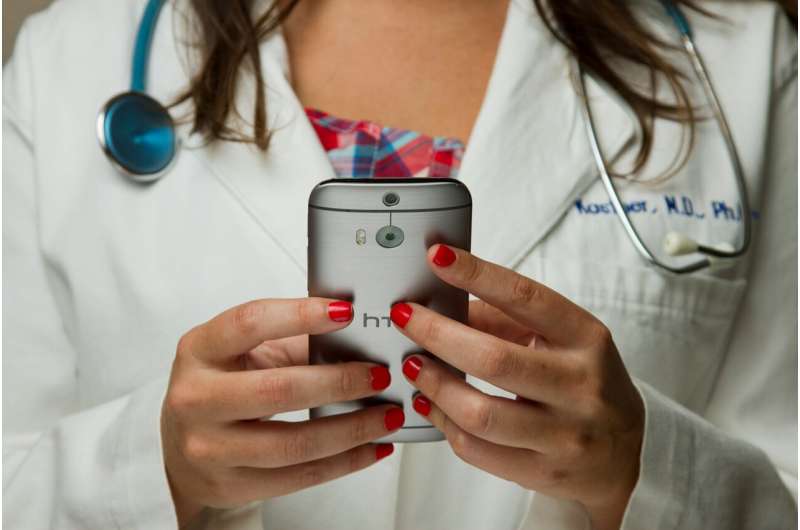This article has been reviewed according to Science X's editorial process and policies. Editors have highlighted the following attributes while ensuring the content's credibility:
fact-checked
trusted source
proofread
AI technology takes notes for clinicians, allowing them more time with patients

Clinicians at Stanford Health Care will soon have access to an AI-powered app that can securely listen to interactions with patients and automatically generate draft clinical notes. The app, which was recently tested in a pilot program at Stanford Health Care, harnesses ambient voice recognition technology to create a written summary that captures essential clinical details.
Doctors and other care providers take notes during appointments as a standard practice, often wrapping up patient histories or logging details of care plans after the appointment. The ambient listening technology, DAX Copilot, developed by Nuance Communications, a Microsoft company, is expected to help shoulder much of that workload.
"This can be a meaningful way to allow our clinicians to spend more time with their patients and reduce the burden of administrative, nonclinical work that is a huge source of burnout," said Niraj Sehgal, MD, chief medical officer at Stanford Health Care.
Through this new effort and others, such as the RAISE Health initiative, Stanford Medicine actively seeks to integrate new AI-driven technologies effectively and responsibly—in this case, to help facilitate the provider-patient connection. "It's about helping clinicians do more of what they love—talking to patients and focusing on that engagement and therapeutic relationship," said Michael Pfeffer, MD, Stanford Health Care's chief information officer.
Listen up
To use the app, the clinician first obtains consent from the patient to securely record the conversation through an app on their smartphone, then continues with the appointment. Once the recording stops, an algorithm processes the data and, seconds later, generates a draft clinical note.
The technology is able to discern friendly chit-chat from discussions of pertinent health information, effectively becoming an invisible assistant that selectively prioritizes the relevant pieces of the patient's history and details of their appointment.
The clinician can then review the notes, adding to them or editing them, and approve the final version for the patient's electronic health record. Throughout the process, all conversations and data remain secure and HIPAA-compliant, said Patricia Garcia, MD, associate chief medical information officer, who, along with Stephen Ma, MD, clinical informatics fellow, helped run the pilot program. Clinicians can add to notes in the patient chart using voice prompts during an appointment; these notes are incorporated into the documentation.
Chief medical information officer Christopher Sharp, MD, who helped lead the pilot program and participated in it, is excited to see how automated and generative AI apps can help boost doctor-patient relationships. "One of the things that was most remarkable to me was my ability to turn away from my keyboard, face the patient and really listen, knowing that everything shared in our conversation was being documented without me having to spend a lot of mental or physical energy capturing it in the moment."
Less stress
Starting in the fall of 2023, 48 physicians in a variety of specialties—including primary care, cardiology, orthopedic surgery, rheumatology and neurology—tested the technology.
Through a preliminary survey, about 96% of physicians reported that the technology was easy to use, and 78% reported that it expedited clinical note taking. About two-thirds reported that it saved time.
"That's the win here," said Gary Fritz, chief of applications at Stanford Health Care. "An hour saved, for instance, can help rebalance a provider's too-often overburdened day and cognitive load."
Stanford Medicine clinical and technology leaders plan to roll out the app to all care providers at Stanford Health Care, including, physicians, nurse practitioners, physician assistants, resident physicians and medical students.
Advances to the technology—such as the ability to customize note style, suggest orders or edit drafts using natural language—are also on the horizon.
"This could have a transformative impact on the way we provide clinical care. AI tools will never replace the clinician, but it might replace parts of their workflow," Sehgal said. "As people get more comfortable using AI-powered technology, it creates a fertile ground to continue adapting other tools for the workplace that support providers, freeing them to better care for patients."




















